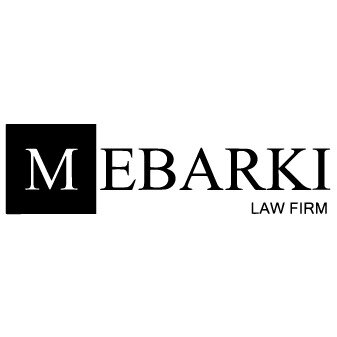Best Tax Lawyers in Algeria
Share your needs with us, get contacted by law firms.
Free. Takes 2 min.
Or refine your search by selecting a city:
List of the best lawyers in Algeria
About Tax Law in Algeria:
Tax law in Algeria revolves around several key principles and regulations aimed at ensuring compliance and fairness in the taxation system. The tax system in Algeria includes various types of taxes such as income tax, corporate tax, value-added tax (VAT), and customs duties, among others. It is crucial for individuals and businesses to understand their tax obligations and adhere to the tax laws to avoid legal issues.
Why You May Need a Lawyer:
There are several situations where you may need a lawyer's assistance in tax matters in Algeria. This includes handling complex tax issues, representing you in tax disputes or audits, advising on tax planning strategies, assisting with tax compliance, and ensuring that you understand your rights and obligations under Algerian tax laws. A lawyer specializing in tax law can provide valuable guidance and support to help you navigate the complexities of the tax system effectively.
Local Laws Overview:
Key aspects of Algerian tax laws include determining taxable income, calculating and paying taxes, filing tax returns, complying with reporting requirements, understanding tax incentives and exemptions, and resolving tax disputes. It is essential to consult a qualified legal professional with expertise in Algerian tax laws to ensure compliance and mitigate any potential legal risks.
Frequently Asked Questions:
1. What are the different types of taxes in Algeria?
Algeria imposes taxes such as income tax, corporate tax, value-added tax (VAT), customs duties, and various other taxes.
2. How can I ensure compliance with Algerian tax laws?
You can ensure compliance by keeping accurate records, understanding your tax obligations, filing tax returns on time, and seeking professional advice when necessary.
3. What are the penalties for tax evasion in Algeria?
Tax evasion in Algeria can result in fines, penalties, interest charges, and legal consequences. It is crucial to comply with tax laws to avoid these penalties.
4. Can I appeal a tax assessment in Algeria?
Yes, you can appeal a tax assessment in Algeria through the appropriate legal channels. Consulting a tax lawyer can help you navigate the appeals process.
5. Are there any tax incentives available in Algeria?
Algeria offers various tax incentives to promote economic development, investment, and job creation. Consulting with a tax lawyer can help you understand and take advantage of these incentives.
6. How can a tax lawyer help me with tax planning?
A tax lawyer can help you develop and implement tax-efficient strategies to minimize your tax liability while complying with Algerian tax laws.
7. What is the role of tax audits in Algeria?
Tax audits in Algeria are conducted to verify the accuracy of tax returns and ensure compliance with tax laws. Consulting a tax lawyer can help you prepare for and navigate tax audits effectively.
8. How can I resolve a tax dispute in Algeria?
You can resolve a tax dispute through negotiation, mediation, or by seeking legal recourse through the appropriate legal channels. A tax lawyer can represent your interests and assist in resolving the dispute.
9. What are the key deadlines for filing tax returns in Algeria?
The deadlines for filing tax returns in Algeria vary depending on the type of tax and your individual circumstances. It is essential to be aware of these deadlines and comply with them to avoid penalties.
10. How can I stay updated on changes to Algerian tax laws?
You can stay updated on changes to Algerian tax laws by regularly checking official government websites, consulting legal resources, and seeking advice from tax professionals who are familiar with the latest developments in tax legislation.
Additional Resources:
For additional resources and information on tax laws in Algeria, you can consult the Algerian Ministry of Finance, the Algerian Tax Authority, legal aid organizations, and professional associations for tax professionals.
Next Steps:
If you require legal assistance in tax matters in Algeria, the next step is to seek out a qualified tax lawyer who can provide you with legal advice, representation, and guidance tailored to your specific needs and circumstances. A tax lawyer can help you navigate the complexities of Algerian tax laws and ensure compliance while protecting your rights and interests.
Lawzana helps you find the best lawyers and law firms in Algeria through a curated and pre-screened list of qualified legal professionals. Our platform offers rankings and detailed profiles of attorneys and law firms, allowing you to compare based on practice areas, including Tax, experience, and client feedback.
Each profile includes a description of the firm's areas of practice, client reviews, team members and partners, year of establishment, spoken languages, office locations, contact information, social media presence, and any published articles or resources. Most firms on our platform speak English and are experienced in both local and international legal matters.
Get a quote from top-rated law firms in Algeria — quickly, securely, and without unnecessary hassle.
Disclaimer:
The information provided on this page is for general informational purposes only and does not constitute legal advice. While we strive to ensure the accuracy and relevance of the content, legal information may change over time, and interpretations of the law can vary. You should always consult with a qualified legal professional for advice specific to your situation.
We disclaim all liability for actions taken or not taken based on the content of this page. If you believe any information is incorrect or outdated, please contact us, and we will review and update it where appropriate.
Browse tax law firms by city in Algeria
Refine your search by selecting a city.












